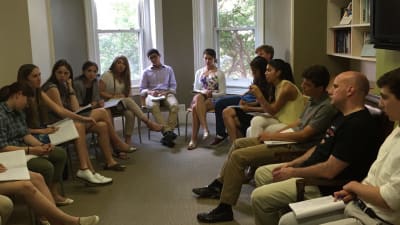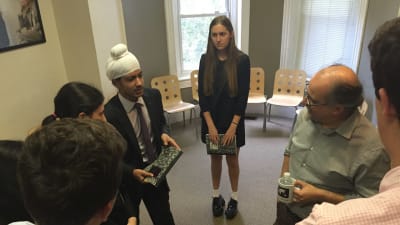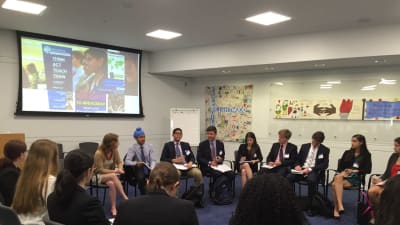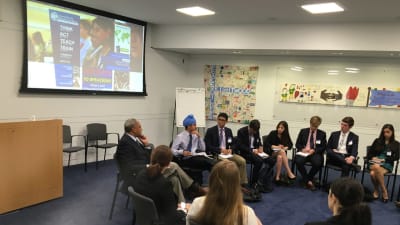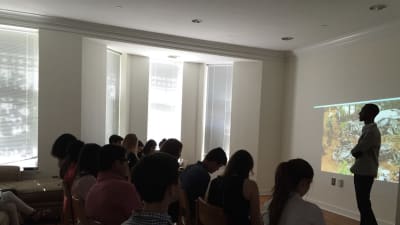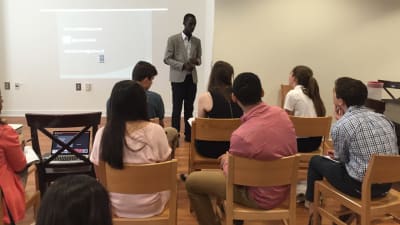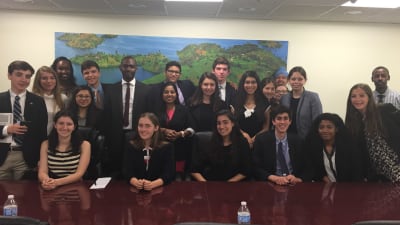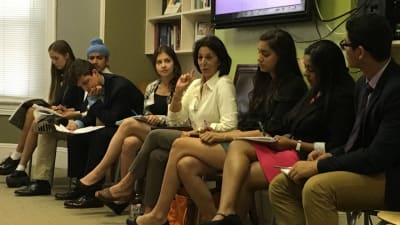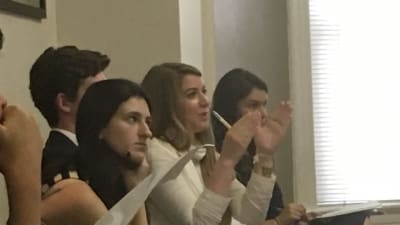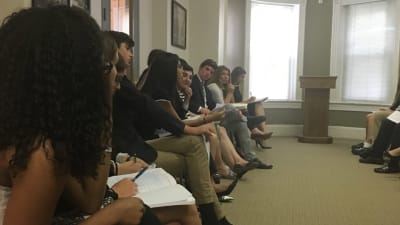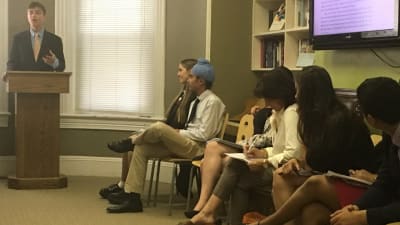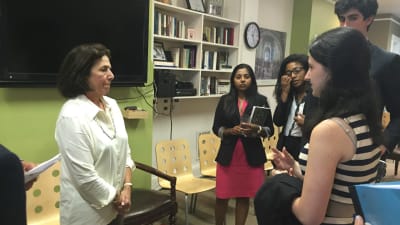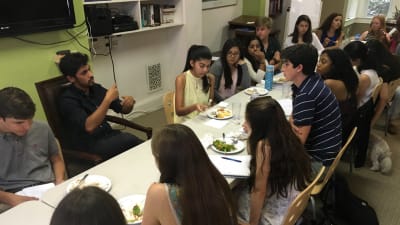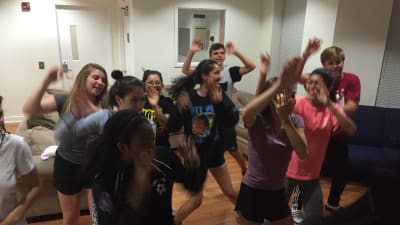Ethics Mash-up: Rwanda, Israelis and Palestinians, and The Second Amendment (with a side of Marco Rubio)
Our Summer Institute days pack a powerful punch, and recent domestic and international events have heightened our purpose here. In the last week and a half we have confronted three complicated cases and visited with a former NRA President, the Executive Director of a leading gun control group, a former Assistant Secretary of State, genocide survivors, a former lead Palestinian negotiator, and President Bush’s lead Middle East advisor.
See what I mean?
Having already met with Carl Wilkens, the only American to stay behind during the 1994 Rwandan genocide, we walked two blocks from our summer residence to the United States Institute of Peace to hear from Ambassador George Moose. Moose was Assistant Secretary of State for African Affairs during the genocide, and he helped students appreciate the bureaucratic decision making that stymied attempts to intervene. More important, he helped students see the legitimate reasons governments do not want to intervene in such conflicts, and introduced them to President Obama’s Presidential Study Directive 10 on mass atrocities.
Later, we traveled to the Rwandan Embassy and met with two lead officials there who shared information about Rwanda’s reconciliation attempts, the nation’s current challenges, and the officials’ personal stories. And last weekend we welcomed Rwandan genocide survivor Yannick Tona, who told us a harrowing but also hopeful personal story that left students with plenty to discuss. We rounded out this case study with a visit to the U.S. Holocaust Memorial Museum, where we gained exclusive access to the collection an hour before the general public arrived.
Our next case study was the Israeli-Palestinian conflict. We began with SEGL’s account of Israeli-Palestinian history: the competing promises of T.E. Lawrence and the Balfour Declaration, the competing boundaries in 1948, 1967, and today, the competing visions for the future within Israel and within the Palestinian leadership. This historical account makes every attempt to be unbiased, but we also told the students that many observers on both sides would want to add, subtract, or edit each PowerPoint slide they viewed. Skeptical eyes and ears are a must in this area. (We also underlined another SEGL truism: if, after a case study, you want to hear a view different from the ones presented, say something! If there is enough interest, we can often arrange for a supplementary speaker later in the semester; if there is not enough interest, any interested student can set up her or his own meetings during a free period.)
To help us understand the conflict better, we met with two experts: first, Elliot Abrams, President George W. Bush’s Deputy National Security Advisor and National Security advisor on Middle East Affairs (Abrams also served President Reagan as Assistant Secretary of State on three occasions); second, with Ghaith al-Omari, a former top advisor to Palestinian leader Mahmoud Abbas and a negotiator in the 2000 Camp David peace talks.
On Wednesday, we visited the Israeli Embassy to hear the government’s official position on the conflict, as well as the complexities of navigating toward peace while simultaneously fending off violence. Then, on Thursday at lunch, we welcomed Suhayb Al-Jawhari, an SEGL alumnus of Palestinian descent who also teaches Arabic at SEGL. He spoke informatively and passionately about his views and his personal story, and the students enjoyed hearing how SEGL had influenced his thinking.
As you might expect, the viewpoints we heard were quite varied, and many students reported feeling buffeted by each speaker’s strong arguments. In discussions that followed, several noted how valuable it was to hear the side they had understood less.
Given the rash of gun violence in recent weeks (Orlando, Dallas, and now Baton Rouge), we thought it appropriate to invite two additional speakers who could address the Second Amendment. (We are also addressing the killings in Baton Rouge and Falcon Heights, but those do not directly include Second Amendment questions.)
On Monday, we boarded a small bus and drove to the national headquarters of the National Rifle Association. We began with a guided tour of the National Firearms Museum (want to see a gun carried on the Mayflower, or one used in a Dirty Harry movie, or one given to Princess Diana by the British on the occasion of her marriage?) and then met with former NRA President David Keene. Keene (who remains on the NRA board and who edits the Washington Times opinion pages) is a grandfatherly and passionate advocate for gun rights.
Later, we met with Ladd Everitt, the former Communications Director for the Coalition to End Gun Violence and newly-minted Executive Director of One Pulse for America, actor George Takei’s new gun control advocacy group. Everitt, another SEGL regular, argued from political, ethical, and legal perspectives that gun control legislation is essential. (Want to see Everitt on The Daily Show? Click here.)
Depending on their life experiences, Keene and Everitt presented perspectives that many of our students had not heard but learned to appreciate. Most came away with their political views intact, but with conviction that the other side’s view were well-reasoned. (This, of course, is at the heart of SEGL’s pedagogy: the belief that understanding and empathizing builds far more progress than discrediting and destroying.)
Learning how to ask tough-but-respectful questions and how to discuss the most deeply-felt issues is an essential part of leadership, and it is an essential part of an SEGL education. We’re proud of how our students handled these case studies, which they continue to discuss over dinner and over weekend fun.
Speaking of fun: in such a busy time, our students are making time for it! We have visited the Newseum, taken a nighttime walking tour of the National Mall, and continued our Squash on Fire escapades. And yes, we did run into Marco Rubio on our trip to Georgetown!
We’re also learning more about each other: for example, one student lead an impromptu workshop on Indian dancing and other invited us to a communal meal in the famous Kennedy Caucus Room in the Russell Senate Office Building to learn about the values of Sikhism. These experiences help our group grow stronger, and they are particularly fun to watch.









